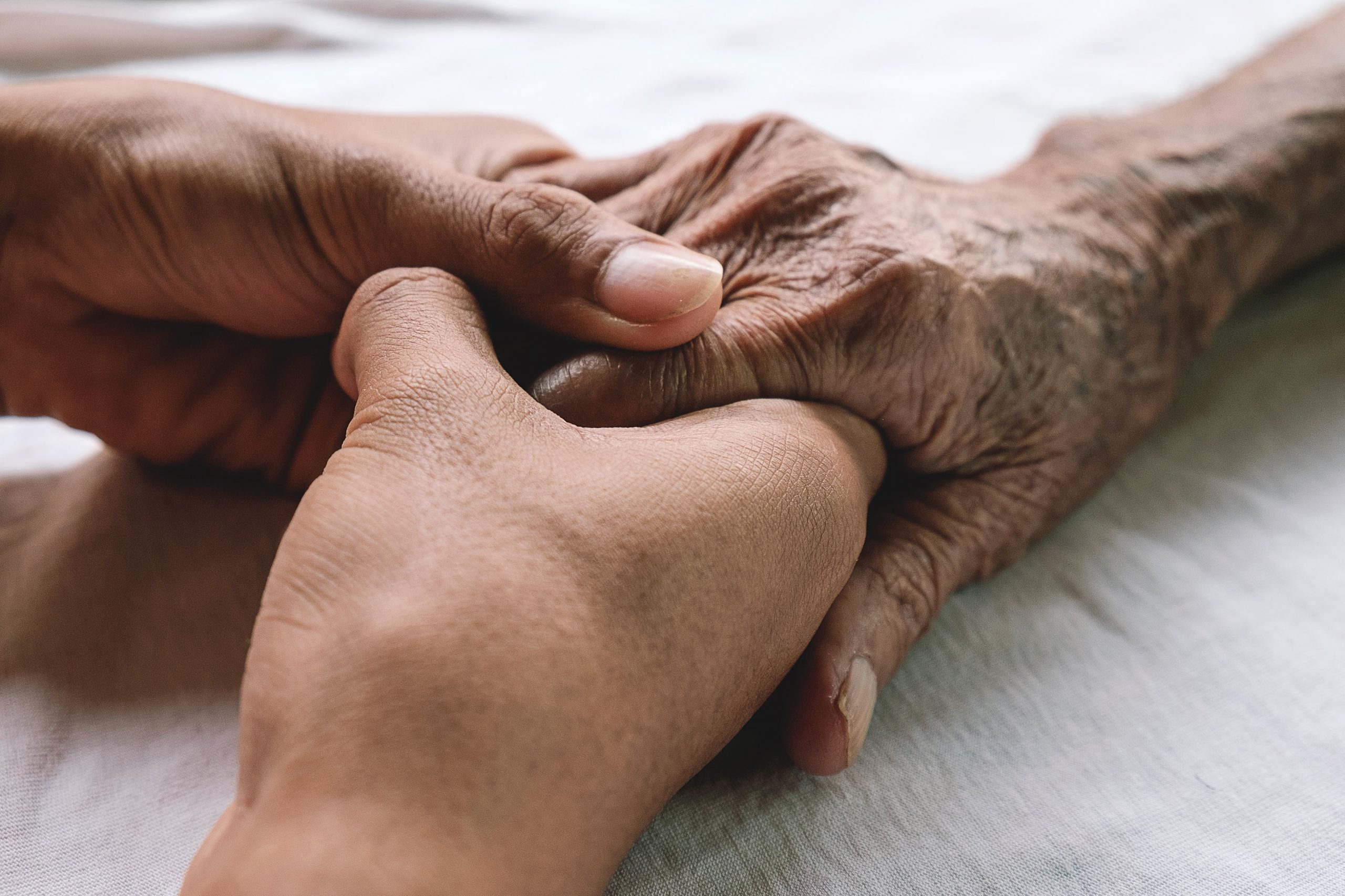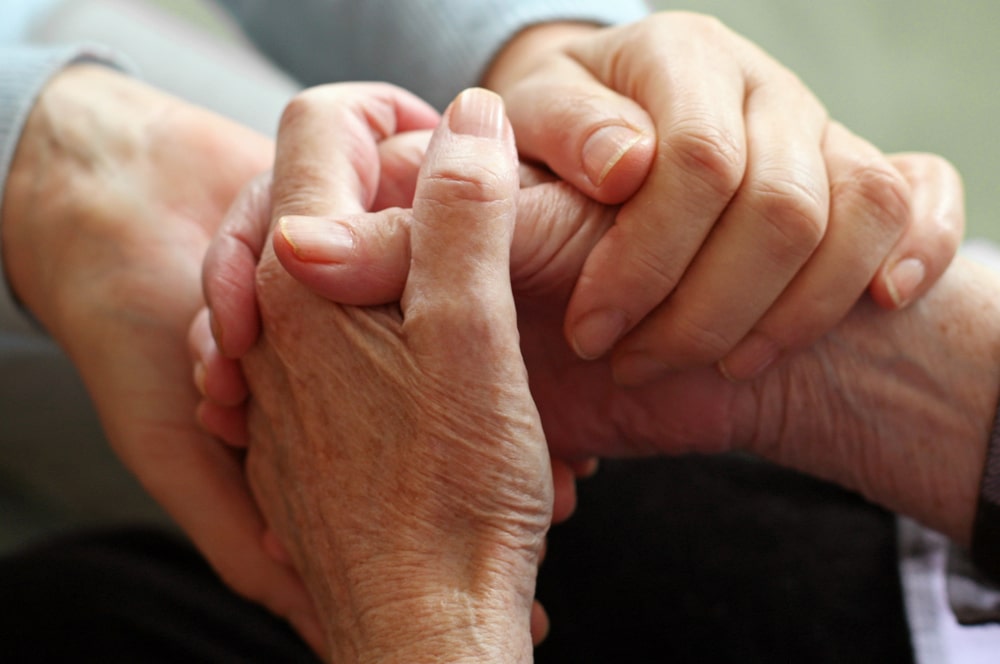
After months, weeks, or days of hospice care, your loved one has died. At this point, you may be experiencing a wide range of complex and sometimes confusing feelings. These may include sadness, fear, anger, guilt, relief, and shock or disbelief. All of these emotions are normal reactions to loss, and they can vary greatly from person to person.
Having witnessed this spectrum of emotions throughout his years of walking with families through grief, Dr. Alan Wolfelt, a nationally respected grief counselor, author, and educator, has come to identify six needs of mourning. It is only after these six needs are met that we can move toward healing and reconciliation following a loss.
But what are the six needs of mourning, you ask?
The 6 Needs of Mourning
The journey through grief often begins with a meaningful, healing, and personalized funeral or memorial service. The more personal, the more healing. Dr. Wolfelt has found that those who take part in a meaningful service have a firm foundation for their grief journey and “through their own grief work and through the love and compassion of those around them, are most often able to reconcile their grief and go on to find continued meaning in life and living.”
People often mistakenly think of the funeral or memorial service as an act of closure. This isn’t the case. In fact, the service is only the beginning of your grief journey. The challenge ahead of you is to walk through each of the six needs of mourning along the way toward healing.
Let’s look at each need individually and discuss what each one may look like in your life.
Need #1 – Acknowledge the reality of the death

When we lose someone we love, our minds naturally rebel against the knowledge. We don’t want to believe what has happened, even if we’ve had months of hospice care to prepare. We reject reality. But in order to heal, we must confront the truth. So, in some way, you must come to acknowledge the reality of the death. This may mean spending time with the body before burial or cremation, attending the funeral or memorial service, visiting the graveside, or something as simple as intentionally using the past tense when speaking about the person. In time, your mind will accept the reality of what has happened, and you can begin to process through the emotions of loss.
Need #2 – Move toward the pain of the loss

Dr. Wolfelt says, “I have learned that if we are to heal we cannot skirt the outside edges of our grief. Instead, we must journey all through it, sometimes meandering the side roads, sometimes plowing directly into its raw center.” After caring for a loved one through a serious illness, you may feel tired and emotionally spent, which can lead to an emotional shut down. This is understandable. The funeral or memorial service gives you a start on confronting your loss, but it will take time. It will take intentionality.
Instead of turning away from what you feel, allow yourself to grieve and heal. This may mean talking to trusted friends about your experience, writing in a grief journal, going for long walks, crying, or vigorous exercise to release stress. We all deal with our emotions differently, but as long as you aren’t hurting yourself or others, do what you must to face the pain and let the emotions out. Emotions that are stifled or allowed to fester will only lead to pain down the road, so deal with them as they come now.
Need #3 – Remember the person who has died

In order to heal, we must shift our relationship with the one who has died from one of physical presence to one of memory. To do this, it’s important to actively find ways to remember the person who has died and to honor their legacy. In many ways, you do this by telling the story of your life with your loved one. According to Dr. Wolfelt, “the more we ‘tell the story’ the more likely we are to reconcile to the grief.”
So, be intentional about creating opportunities to share and to remember your loved one’s life. Bring friends and loved ones together for a shared remembrance meal. Don’t be afraid to share the stories of your life – growing up, in school, at work, at play, etc. Also, you might choose to create a memorial item, like a scrapbook, photo book, art piece, composition, or whatever else makes sense for you. As you create and design the memorial item, you engage with your memories and find comfort in them.
Need #4 – Develop a new self-identity

To some degree, our relationships give us an identity. Father, mother, sister, brother, friend, grandchild…and caregiver. After caring for a loved one with prolonged illness, you may feel a bit lost, like a part of you has died, too. This is because we gain some sense of identity from the roles we take on and the relationships around us. After losing a close relationship and the identity we held with it, we have to step into a new identity, whether we want to or not.
In order to move forward with your life, you must accept your new role and find a way to live it well. Try a new activity or start a new hobby. Go on a trip. Take a much-needed break. Meet up with friends for coffee. Volunteer for a cause you believe in or an organization that helped your loved one. All of these activities will help you discover your new role and help you transition from who you were to the new person you are becoming.
Need #5 – Search for meaning

As part of the grief process, we naturally question the meaning of life and death. Why did this happen to the person I love? Why didn’t they get better? The answers you find to these “why” questions will contribute to your search for meaning. The death of a loved one confronts us with an inescapable fact: we will all die. And because one day we, too, will face death, we must wrestle with how our lives look today. Ask yourself if there’s something you have always wanted to do or be known for. Have you done it? Why not? Is now the time to get started? Write down your thoughts, talk to friends or family, seek out ways to ask the hard questions, and if you do the work of grief, you will find the answers you need.
Need #6 – Receive ongoing support from others

Lastly, we need each other. We aren’t meant to go through life alone. The funeral or memorial service provides an excellent time to give and receive support, but you will still need support far beyond the ceremony. You may be tempted to work through these needs on your own – don’t. There are moments when time alone is needed, but also look for ways to invite others into your life. Find a group to support you – through church, school, or local support groups. The people around you can offer an incredible reserve of strength, kindness, and encouragement.
These are the six needs of mourning. You won’t necessarily experience them in any particular order. In fact, you may experience several at once. For example, you may sit down with a friend and receive support while also talking about your plans to make changes to your life. In this way, you are meeting needs #5 and #6. You will meet many of these needs quite naturally, but you should still be intentional about facing your loss.

And remember – grief is a journey. There’s no hurry. No set time frame. Sometimes you can move forward after three months, sometimes three years, sometimes longer. The time it takes doesn’t matter. What matters is that you are working through your journey and these six needs. You are looking for ways to reconcile yourself to what has happened and finding a way to move forward. Those who don’t find a way to move forward often become stuck in their grief, unable to move. Don’t allow yourself to become stuck – do the work of grief and find a way to continued meaning and new hope for the future.
















































Recent Comments